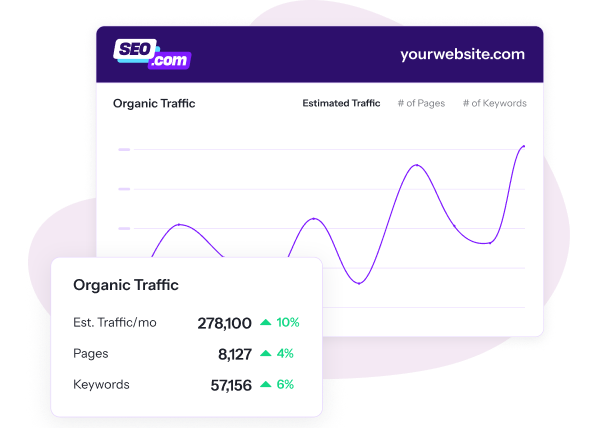-
 8 min. read
8 min. read
-
 Emily Carter, M.S.
Emily Carter, M.S. Content Delivery Lead
Content Delivery Lead
- Emily is WebFX’s Content Delivery Lead. She holds an M.S. in digital marketing and leads the FX content team, along with strategy, implementation, and evaluation for WebFX’s key revenue channels. Her work has been featured by Social Media Today, Campaign Monitor, Reader’s Digest, Yahoo, and more. In her free time, she enjoys hiking, road trips, and exploring new cities. Follow her on Twitter @emcarter16 or connect on LinkedIn. @emcarter16
Today, more than 90% of online experiences start with search engines. When people want to find businesses, products, and services, they start their quest with a simple online search. Fortunately, search engine optimization (SEO) ensures you’re there to meet them at the top of the search results — and with SEO Checker, you can see what’s holding your website back from the top spot.
But what if you’re a local business looking to boost traffic to your physical store? How does local SEO differ from traditional, organic search optimization — and which should you use? Luckily, your favorite marketing team is here to answer all your SEO vs. local SEO questions. Just keep reading, or contact us to ask a strategist your burning questions!
What’s the difference between SEO and local SEO?
Both traditional and local SEO focus on improving your rankings in online search results so more people can find, contact, and purchase from your business. Here’s the difference.
While traditional SEO focuses on improving your site’s visibility on a national or global scale, local SEO focuses on improving your visibility in local search rankings. SEO and local SEO use many of the same strategies. However, local SEO solutions employ specialized measures to help you connect with searchers in your area.
Now that you know the difference between SEO and local SEO, let’s look at some hallmarks of each strategy.
What is SEO?
We’ll start with a definition of traditional SEO, also known as organic or national SEO. Valuable for businesses in any sector, SEO includes numerous on- and off-page strategies to boost your website’s rankings in relevant search results.
Anatomy of a traditional search result
To better understand how SEO works, let’s look at the anatomy of a search result for the keyword “rent camping gear.”
Paid ads
When searching on Google, you’ll first notice a series of paid search advertisements, which are often facilitated by paid-per-click (PPC) services. Marked with “Ad” labels, these PPC ads appear at the top of search results — above organic results.
 We’re not focused on these results when talking about SEO, but they’re important to note.
We’re not focused on these results when talking about SEO, but they’re important to note.
SERP features
Next, you may see several SERP features, depending on the search. SERP features are special results intended to provide searchers with helpful information — often without needing to click on a result. These things include:
- Featured snippets
- Reviews
- Sitelinks
- Videos
- Accelerated Mobile Pages (AMP)
- People also ask boxes
- And more
When searching “rent camping gear,” I see a featured snippet, immediately after the paid ads, that answers the question, “Can I rent camping equipment?”
Organic search results
Finally, we see a list of unpaid search results — the “meat” of organic SEO.  Since 68% of all clicks go to the first five positions in search results, it’s extremely important to maintain top rankings, so people can find and contact you. How do you rank at the top of search results on a national or even global scale?
Since 68% of all clicks go to the first five positions in search results, it’s extremely important to maintain top rankings, so people can find and contact you. How do you rank at the top of search results on a national or even global scale?
The answer is SEO — and it consists of numerous rank-boosting strategies.
Traditional SEO strategies
When optimizing for traditional SEO vs. local SEO, you’ll likely use the following strategies:
- Conduct keyword research and target relevant keywords on your website
- Create quality, in-depth content about your industry, products, and services
- Speed up your website’s load time
- Streamline your code and navigation
- Earn backlinks from reputable websites to improve your domain authority
- And more!
In short, these SEO strategies ensure your business shows up at the top of search results when people search keywords related to your business, products, and services. Ultimately, SEO allows more people to find, contact, and purchase from your business — and it translates directly into increased revenue.
What businesses should use SEO?
SEO benefits businesses of all sizes in a wide array of industries, from ecommerce to tech and more. Just take a look at our case studies to learn more about how SEO drives results for WebFX clients.
That said, some businesses benefit from a more local approach to SEO. To learn more, let’s take a deep dive into local SEO: what is local search, who is it for, and how is it different from traditional, organic SEO?
What is local SEO?
Local SEO — a subset of traditional SEO — focuses your optimization efforts on reaching more local searchers. For example, let’s say I’m planning a trip and search, “best hotels in LA.” If you own or manage a hotel in the LA area, you want to show up at the top of the local results for that search — and local SEO can help you get there.
 Since 80% of local searches convert, it’s hugely important to invest in local SEO if you’re a local business looking to boost foot traffic, sales, and revenue.
Since 80% of local searches convert, it’s hugely important to invest in local SEO if you’re a local business looking to boost foot traffic, sales, and revenue.
Anatomy of a local search result
In addition to ads, SERP features, and organic listings, local search results contain some unique features. Let’s take a look at another example to understand the difference between traditional and local search results.
Local SEO 3-pack
If I search “best restaurants in LA,” Google returns a local SEO 3-pack — a map and list of the top three restaurants that match my search criteria. It looks like this:
Google pulls the business information from the restaurants’ Google My Business profiles, so it’s extremely important to claim your listing (more on that later) when optimizing for local SEO.
In some cases, like the hotel example above, Google pulls results from Google Travel, which is why you may see more than three options. You’ll see the same thing when searching, “flights to LA,” with a list of available flights and prices from Google Travel.
Google Local Services ads
For some local searches, you may notice Google Local Services ads.
These ads appear at the top of local search results, and they operate similarly to PPC ads. Again, these paid ads aren’t part of the organic search results, but they do appear in local searches. They look like this:  Currently, Google Local Services is only available to select industries and cities, so you’ll need to confirm your eligibility.
Currently, Google Local Services is only available to select industries and cities, so you’ll need to confirm your eligibility.
If you want to learn more about how you can advertise with Google Local Services, check out our stress-free ad options.
GET STARTED WITH GOOGLE LOCAL SERVICES ADS
Local SEO strategies
In addition to traditional SEO strategies, local SEO employs some additional tactics to help you reach local searchers. These local strategies include:
- Claiming and optimizing profiles on local listing sites like Google My Business
- Earning and managing reviews on local review sites
- Targeting relevant, local keywords on your website
- Creating location-specific website copy
- Adding name, address, and phone number (NAP) information to your site and local directories
- Earning backlinks from reputable, local websites
What businesses should use local SEO?
Not sure if local SEO is right for you? If you work in these industries, you + local SEO = match made in heaven.
- Franchise
- Home and repair
- Industrial
- Heavy equipment
- Real estate
- Legal
- Local consumer services
- Medical and health
- And many others
For companies looking to attract and convert more local traffic, local SEO is essential.
Do SEO and local SEO affect each other?
Great question! It’s impossible to draw a solid box around traditional vs. local SEO — and there’s some overlap between the two strategies. That said, your traditional SEO efforts will likely end up helping your local SEO and vice versa if done correctly. If you already have an SEO plan in place, it may just require a few tweaks to start driving more qualified, local traffic.
For instance, adding location-specific keywords and content vs. more general information allows you to appeal to a local audience. Adding these pages will also help your organic SEO strategy, as you’ll have more opportunities to rank in relevant search results. When navigating the waters of traditional vs. local SEO, it’s helpful to consult the experts — like the team at WebFX. We’ll help to answer all your national SEO vs. local SEO questions, so you can rest assured you’re getting the best business results.
Looking for an all-in-one SEO audit tool? You’ve found it
SEO checker provides data on key metrics to give you:
- Complete SEO score
- Site Speed Analysis
- Content Grade
- and more.
Get started with traditional or local SEO today!
Have more questions about organic SEO vs. local SEO? We have you covered. Check out our resources below to learn more:
- SEO services
- Local SEO services
- Client-managed local SEO: If you prefer to manage your local SEO campaign, this option is for you! Our IBM Watson-backed LocalFX software allows you to fully manage your local SEO efforts, while ensuring you get the best possible return.
Contact us today, or give us a ring at 888-601-5359 to get started with your custom-fit SEO or local SEO strategy!
-
 Emily is WebFX’s Content Delivery Lead. She holds an M.S. in digital marketing and leads the FX content team, along with strategy, implementation, and evaluation for WebFX’s key revenue channels. Her work has been featured by Social Media Today, Campaign Monitor, Reader’s Digest, Yahoo, and more. In her free time, she enjoys hiking, road trips, and exploring new cities. Follow her on Twitter @emcarter16 or connect on LinkedIn.@emcarter16
Emily is WebFX’s Content Delivery Lead. She holds an M.S. in digital marketing and leads the FX content team, along with strategy, implementation, and evaluation for WebFX’s key revenue channels. Her work has been featured by Social Media Today, Campaign Monitor, Reader’s Digest, Yahoo, and more. In her free time, she enjoys hiking, road trips, and exploring new cities. Follow her on Twitter @emcarter16 or connect on LinkedIn.@emcarter16 -

WebFX is a full-service marketing agency with 1,100+ client reviews and a 4.9-star rating on Clutch! Find out how our expert team and revenue-accelerating tech can drive results for you! Learn more
Try our new free SEO checker at SEO.com
Boost your site’s search performance with our free SEO Checker. Analyze your website for optimization tips on titles, headers, content, speed, and more.
Get your Free SEO report

Optimize Your Website Faster with SEO.com
Effortlessly find opportunities and monitor performance with this user-friendly tool designed by the SEO experts at WebFX!
Try it for FreeProven Marketing Strategies
Try our new free SEO checker at SEO.com
Boost your site’s search performance with our free SEO Checker. Analyze your website for optimization tips on titles, headers, content, speed, and more.
Get your Free SEO report






